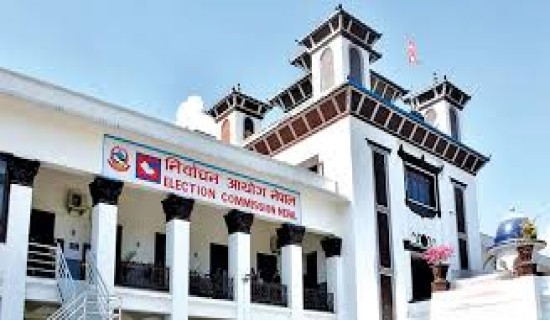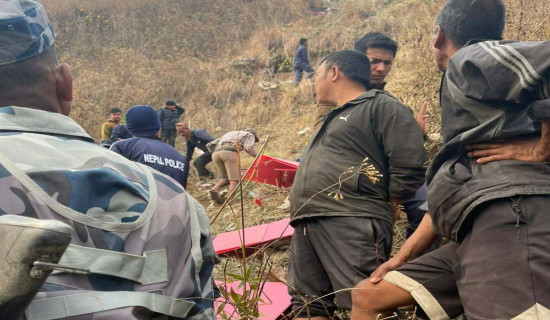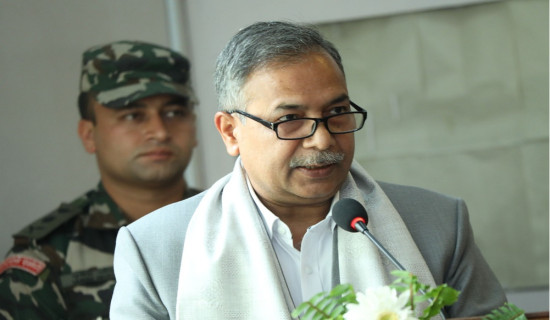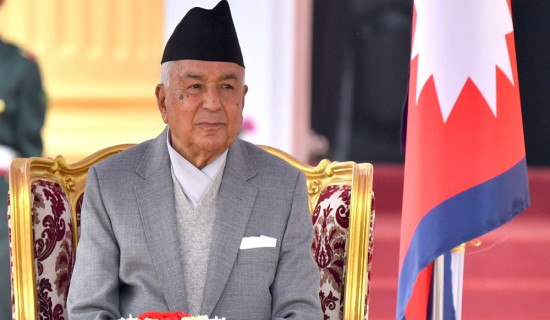- Tuesday, 3 March 2026
Perils Of Power-centric Politics
Nepal’s tryst with plural politics or polyarchy started during the nineties when the non-party authoritarian dispensation headed by the King collapsed. This was followed by the Westminster model of democracy that was introduced replacing the earstwhile Pachayat system. After a year-long haggling over the contents of the new constitution, the basic law of the land was finally agreed upon and enacted transferring and vesting sovereign rights for the first time in the people of Nepal. Multiparty competitive elections were conducted in line with the Constitution of the Kingdom of Nepal. The constitution had provisioned limited monarchy with cabinet system of government. The party-based competitive electoral exercise held in 1991 chose a sizeable band of political leaders to govern the country. The leaders had then an enviable record and credentials of long struggle and unremitting fight for democracy, justice and human rights.
Politically, it was an epoch-making democratic change. This was also credited with building important state institutions and fostering democratic practices to enhance the constitutional governance in the country. Moreover, it was also a period laden with the soaring democratic expectations of the people. People had reposed greater trust on the new crop of political leaders of the multiparty era. But new political actors and groups did exhibit the same traits and tendencies similar to those of the bygone non-party authoritarian era. The popular expectations for an effective basic public services, rights and civic amenities remained unmet and grossly neglected. As a result, frustration and discontents of the people with the new multiparty political milieu swelled and grew disproportionately.
Deviant practices
In fact, the democratic change that was ushered in 1990 was essentially procedural and formal. Of course, liberal democratic institutions had been created at the macro superstructure level. But what had been lacking in them was the substantive, deeper level transformation in their norms, ethos and behaviours to respond to liberal democratic context and accommodate long-cherished democratic aspirations of the people. It is well known a fact that democracy is the best safeguard for fundamental civic rights and basic liberties. It is also the best guarantee of the political innovation, accommodation of contending interests and conflict resolution. However, democracy’s toughest enemies are greedy instincts of political actors who are popularly mandated to govern but feel no shame to indulge into corrupt and nefarious practices. In fact, multiparty democracy in Nepal like in many developing countries has been afflicted with vices and malaises engendered due to deviant practices and ceaseless indulgence of the political actors into mal-governance and abusive practices.
The country was pushed into the ravage of Maoists-led armed insurgency after a decade-long interregnum of the marriage with multiparty democracy with limited monarchy. There were several reasons that could be attributed to the rise of armed insurgency in Nepal, but one of the major contributing factors that had not been addressed for long in the country was the poor political and administrative governance seeped into the body politics. Political realists and scholars like Francis Fukuyama hold the views that if state institutions do not satisfy popular demands and aspirations, political activities take on extra-institutional and extra- constitutional forms of opposition and violent resistance. The anti-regime armed conflict led by the Maoists killed almost seventeen thousand people. The country’s physical and institutional infrastructures were ruinously destroyed. Nevertheless, it was the Maoists-led conflict coupled with the massive people’s movement that rendered the ouster of monarchic rule a possibility in the country.
The country held elections of the constituent assembly that wrote the constitution to herald the era of democratic federal republic of Nepal. The state was restructured into seven provincial and seven hundred fifty three local government entities. Maoist leaders, like the multiparty-era leaders who had vowed to lead the country into the era of social and economic prosperity and justice ending all forms of exploitations and discriminations had been elected to govern the country. Pushpa Kamal Dahal “Prachanda “the Maoist supremo” has been at the helm of state affairs as the country’s prime minister time and again sparingly over the last decades. He has also led the incumbent coalition government composed of a myriad of political combinations.
The radical Maoist leader has managed to sew the political groups of different orientations together to put up a kind of unprincipled coalition. He has made a commitment that the government he has led is meant to deliver good governance and fulfill the pledges made to the people. However, contrary to expectations, the country has been revolving around intriguing political scenario, dilemma stemming, among others, from the crisis of governance. It shows that the political history of mal-governance and abuse of power in Nepal repeats recurrently with a revenge despite political changes and revolutions.
Lust for power
The sorry state of affairs in the politics of Nepal regardless the change in the superstructure has been also due to the power-centric tendencies and approaches of political leadership. The brazen competitive tools and Machiavellian tactics of the political leadership lie at the core of the matter. Their lust for power by hook or crook is manifested into forging alliances of one’s own conveniences, trading of accusation and demonstration of intolerant and mutually incompatible attitudes. Political leaders imbued with competitive temperament and behaviours are always predisposed to deceptive and deceitful maneuvering to extract maximum mileage for their own selfish ends. Nepal, therefore, needs to have accommodative-type democratic leaders who tend to show commitment for broader national interest through consensus. The accommodative democratic-type leadership does not allow deceitful motives to meet one’s own selfish ends.
In Nepal’s democratic development, the transformation in the attitude and orientation of the political actors is very crucial which can be said as prerequisite to the country’s development. Unless the political actors are clean, honest and transparent, democratic politics in Nepal cannot deliver to achieve democratic transformation of the society.
(The author is presently associated with Policy Research Institute (PRI) as a senior research fellow. rijalmukti@gmail.com)











-original-thumb.jpg)




